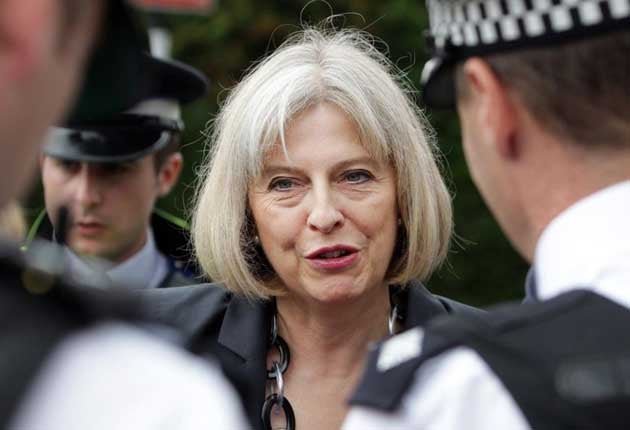'No-go areas' could clear streets

No-go areas could be brought in to clear the streets in a bid to give police the tough powers they need to tackle future riots, the Home Secretary said today.
Theresa May said she was considering whether more general curfew powers were needed to help prevent a repeat of last week's rioting, looting and violence.
Victims will also be given the chance to speak out as ministers said the Government would be establishing an independent communities and victims panel to ensure those caught up in the trouble "can have their voice heard".
Deputy Prime Minister Nick Clegg also said looters will be forced to wear orange suits and help to clean up areas hit by the disturbances as part of "riot payback schemes".
The panel will not be the full inquiry demanded by Labour leader Ed Miliband but was intended to be part of a "grassroots process" to establish what happened, Mr Clegg said.
"We don't want a grandees committee, we want a grassroots process where people in the communities affected and the victims who have been so damaged and hurt can give their views about what needs to happen to ensure it doesn't happen again," he said.
At the same time, he said that the Cabinet Office would be commissioning independent research to find out more about "what happened, who did what and why they did it".
Mr Clegg said he wanted the panel - to be chaired by an independent figure - to work quickly, producing a report to be presented to the leaders of all three of the main parties within six to nine months.
And as David Cameron toured Tottenham in north London, where the first riots broke out 10 days ago, Mrs May suggested existing laws to prevent individuals from entering specific troublespots may not be tough enough.
"At the moment the curfew powers are specific in terms of individuals and attached to individuals and it's whether more general powers are needed.
"In the fast-moving situation that we've seen over the past week, I think we need to make sure the police have just got all the powers available to be able to use them as and when they are necessary."
But she warned that rushing to use rubber bullets against rioters risked losing public support for the police.
The Home Office made it clear that there was nothing to stop forces using baton rounds and water cannon against the rioters, but the police were clear they did not want to use them, she said.
Order was instead restored by "robust policing with the help and support of local communities".
Mrs May has also asked Sir Denis O'Connor, the chief inspector of constabulary, to give forces clearer guidance on tactics, pre-emptive action, the number of officers trained in public order policing, the need for forces to assist others, and the appropriate arrest policy.
But she rejected calls from senior officers to reconsider the Government's 20% cuts to police budgets in the wake of the riots.
Instead, the disturbances showed that controversial proposals to replace police authorities with elected police and crime commissioners, and the introduction of a new National Crime Agency, were now more urgent than ever, she said.
"I am clear that, even at the end of this spending period, forces will still have the resources to deploy officers in the same numbers we have seen in the last week," she said.
As Scotland Yard said more than 1,680 people have been arrested so far in connection with the disorder in London, with more than 980 of those charged, Mr Clegg confirmed plans for a "riot payback scheme".
"In every single one of the communities affected there will be community payback schemes, riot payback schemes, where you will see people in visible orange clothing making up the damage done, repairing and improving the neighbourhoods affected," he said.
But he cautioned about the possible "unintended consequences" of Work and Pensions Secretary Iain Duncan Smith's plan to strip some benefits from convicted rioters.
"We are going to take our time to look at this," he said.
"Of course you need to be proportionate, of course you need to be careful, of course you don't want to create unintended consequences where the taxpayer ends up footing more of the bill or we create more social problems or problems of law and order."
Javed Khan, chief executive of Victim Support, welcomed the schemes, saying that victims "want to see the people who wrought havoc on their communities face up to what they have done and repair the damage they have caused".
But Harry Fletcher, assistant general secretary of the probation union Napo, said such schemes were "financially untenable" at a time when the Government was cutting probation budgets.
Meanwhile, a 16-year-old boy accused of murdering a pensioner while on a looting rampage in Ealing, west London, will appear at the Old Bailey on Thursday. Richard Bowes, 68, died last Thursday after being punched on the Monday before.
The accused teenager, from Hounslow, was remanded in custody as he appeared before magistrates in Croydon alongside his mother, who is accused of perverting the course of justice.
PA
Subscribe to Independent Premium to bookmark this article
Want to bookmark your favourite articles and stories to read or reference later? Start your Independent Premium subscription today.
